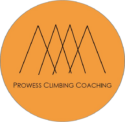There is plenty written on this site about the service we offer and how it is delivered but what do you actually learn? This page looks at the specific content of the courses, how we break things down and what we will actually teach on the day.
The TTPP Model
Our courses are all based around the TTPP Model, which has identified four specific areas in performance sport: Technique, Tactics, Psychology and Physical Skills.
Any course with Prowess Climbing Coaching will be based around this model and will use it to identify your areas of weakness. To figure out which area to work on, I will ask myself these questions to select which area to work on:
- Are you completing the best moves for the route? That’s a technique weakness
- Are you applying yourself in the right way at the right time? If not we need to look at your tactics
- Are you actually applying yourself completely? That will be a psychological issue
- Are you strong enough to complete the moves? We’ll need to look at your physical abilities
This is the first point and don’t be fooled: it takes a lot of experience and expertise to identify the best place to start to help you improve. That is what you are paying for and why you are hiring a coach!
Once the correct aspect of the model has been chosen, it is then a case of addressing the issues at hand as effectively as possible.
Technical improvements
While gaps in technical knowledge is usually related to beginners and those new to the sport, no one is exempt from needing help with their technique. I will use technology to help with technical weaknesses, including video analysis (subject to consent), to help pinpoint technical weaknesses in even the most experienced and advanced of climbers.
Tactical improvements
It is a common misconception that Tactics refers to competitive sports and isn’t relevant to rock climbing. Route reading, rest periods and self-reflection are all examples of effective tactics when rock climbing, as well as competition tactics. This is often an overlooked aspect of performance than can be utilised to improve one’s climbing very quickly.
Psychological improvements
Some psychological blocks can be obvious but many more are far more subtle and particularly difficult to identify, especially in yourself. Body language is the key here and I have a stack of experience and expertise in getting you to reach your own potential.
Physical improvements
Of course, it may simply be the case that you are not yet strong enough to push yourself onto the climb you want to complete but don’t be fooled: it is very unlikely that i’ll be suggesting extend periods on campus boards. There are a host of tips, tricks and methods of getting stronger for your projects while also improving your other attributes and keeping the fun in your climbing.
